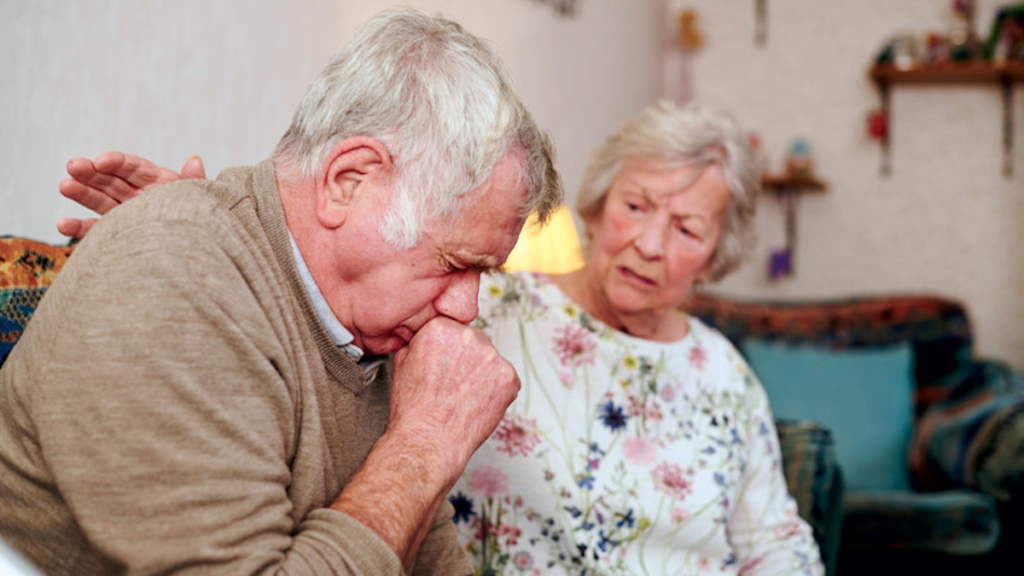
Chronic obstructive pulmonary disease (COPD) is a chronic lung condition that progresses and worsens over time. People with COPD have difficulty breathing due to a build-up of mucus, or damaged and inflamed airways in the lungs. There is currently no cure. According to the National Heart, Lung, and Blood Institute, approximately 16 million people in the United States have been diagnosed with COPD and many others may be undiagnosed and untreated.1
The threat of COVID-19 is especially acute for anyone with preexisting medical conditions or weakened immune systems. While those with COPD are not any more likely to get infected with COVID-19, the risk of severe complications from infection does increase five-fold.2
What Are the First Symptoms of COVID-19?
Symptoms may appear 2-14 days after virus exposure. Symptoms vary but may include:
- Fever or chills
- Cough
- Shortness of breath or difficulty breathing
- Fatigue
- Muscle or body aches
- Headache
- New loss of taste or smell
- Sore throat
- Congestion or runny nose
- Nausea or vomiting
How Does Coronavirus Affect COPD?
The novel coronavirus COVID-19 is a highly contagious respiratory illness. The virus is transmitted through respiratory droplets in the air passed along by breathing, sneezing, and coughing.
While COPD patients are no more likely to contract the disease than anyone else, if they do become infected there is the possibility that symptoms may be more severe because of COPD. These symptoms include fever, dry cough, shortness of breath, body aches, and sometimes even a loss of smell or taste.
Is COVID-19 Dangerous for COPD Patients?
People with COPD who contract the virus may experience extreme breathlessness. With lungs already compromised by COPD, the body will have greater difficulty fighting off the infection.
Doctors warn of a significantly increased risk of severe complications if someone with COPD becomes infected. There is also a greater likelihood of hospitalization.
What Extra Precautions Should COPD Patients Take to Protect Against COVID-19?
Continue to follow the CDC recommendations3 to prevent coronavirus infection including wearing a mask when out in public, practicing social distancing, and get tested if an infection is suspected. For COPD patients, it is critical to take the following measures to stay safe and healthy.
Social Distancing
Due to heightened risk, a person with COPD should avoid direct interaction with others as much as possible, including limiting visits to high traffic locations such as grocery stores. Alternatives include shopping online with pickup or delivery options or asking a friend or family member to do the shopping for you.
Washing Hands and Sanitizing Surfaces
Washing your hands, especially after coming in from outside or coming into contact with others, helps prevent the virus from passing from your hands to your eyes or nose.
Studies also show that the virus may be able to last for hours on surfaces, so it is important to sanitize and clean common household surfaces to help prevent infection.4
Stock Up on Medication
The Respiratory Health Association suggests maintaining at least a 30-day supply of all prescribed medications.5 Due to increased risk of severe complications if infected, it is important to stay consistent with any and all medicine routines and therapies.
Keeping Your Oxygen Concentrator Nasal Cannula Clean
If you are currently on oxygen therapy, be sure to wash your nasal cannula at least once a week with warm, soapy water. Rinse with a solution of water and vinegar to kill bacteria, then rinse with hot water and air dry.
Replacing Your Oxygen Concentrator Accessories
For sanitation purposes, you should be changing your oxygen concentrator nasal cannula and tubing every 3 to 6 months. Inspect your tubing for cracks and wear regularly. If your oxygen concentrator has a filter be sure to change it according to the recommendations from the manufacturer.
Continuing Your Oxygen Therapy
It is important that anyone with COPD that is currently prescribed oxygen therapy continue their use of oxygen therapy during the pandemic. Use of an oxygen concentrator helps maintain your existing lung health and may help reduce complications if infected.
What Is the Treatment for a Patient with COPD and CORONAVIRUS?
Current vaccinations are the best defense against COVID-19 for patients with COPD. If someone with COPD has already contracted the virus, they may be treated with a class of drugs known as corticosteroids, which reduce inflammation in the body. This treatment is especially helpful for COPD patients who are already on a ventilator due to COVID-19.
If you have recently been prescribed oxygen therapy for COPD, or have questions regarding your current oxygen therapy needs, The Oxygen Concentrator Supplies Shop is here to help. Our expert customer care team is available via phone at 888.941.1688 or via email at contact@oxygenconcentratorsupplies.com.
References:
- National Heart, Lung, and Blood Institute. What Is COPD? Accessed May 29, 2020.
- Lippi G, Henry BM. Chronic obstructive pulmonary disease is associated with severe coronavirus diseases 2019 (COVID-19). Resp Med. 2020 Jun;167:105941.
- Centers for Disease Control and Prevention. How to Protect Yourself & Others. Accessed May 29, 2020.
- World Health Organization. Q&A on coronaviruses (COVID-19). Updated 17 April 2020. Accessed May 29, 2020.
- Respiratory Health Association. Coronavirus and COPD: What You Should Know. Published 9 March 2020. Accessed May 29, 2020.lt;/li>



